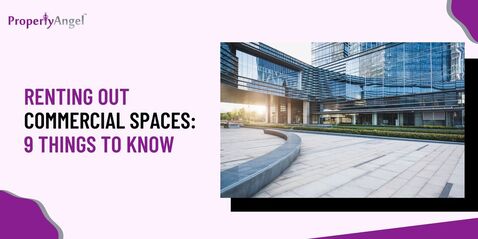|
Renting a residential home has a lot in contrast to leasing a commercial property. It involves larger premises, greater rent, and higher agency costs, resulting in increased total investment. In addition, while residential agreements are typically for 11 months, commercial B2B or B2C agreements are signed for longer periods. Therefore, there are too many complications involved, and one must check these before settling on the best home for them. If you are newly renting a commercial property, you should consider hiring a professional commercial property management company. The real estate sector in India faces fierce competition. Thus rent agreements on commercial properties must be carefully negotiated. You must be aware of the appropriate questions to ask and the laws that apply to your particular organization. Understanding such regulations will also help you avoid costly mistakes and save money. The Transfer of Property Act governs all commercial property rent/lease agreements. A commercial property management company will save you from the hassle and make your life easy. A Commercial rental agreement involves renting a property for commercial purposes. This can include renting a store, an office, an industry, or other commercial structures. Unlike other contracts, the retail leasing agreement does not have a conventional or necessary format. The party may use any form as long as the main parts of the leasing agreement are included. If you hire a professional commercial property management company, they will take care of everything on the leasing front. All important particulars for renting a commercial property management companyOwnership and rent validationMake sure that you have comprehensive property ownership data because this data might be needed in the future. Before signing the agreement with the landlord, conduct more research to ensure no sub-rent or other rent is linked with the property. Well suited renting agreementBefore entering into any form of mutual commitment with the landlord, ensure that the renting agreement is appropriate based on why you need to rent out commercial property. Be specific about the nature of the rent, whether it will be a retail store, a restaurant, or a co-working office space agreement. A professional commercial property management company will ensure that all the formalities are carried out smoothly and fully transparently between both parties. Verification of mortgage and income tax detailsIn the event of a commercial rental agreement, it is usually a good idea to check the landlord's income tax history to see if any current disputes or unlawful procedures are going on. This will also clarify whether the property is classified as 'commercial' or residential' under the Development Control Regulations under the Income Tax Act of 1961. Background check of the commercial property management companyIt is also critical to conduct a background check on the commercial property management company before hiring them. Their previous clients will provide you with truthful information about the commercial property management company. You can also request them to share experiences with previous clients. However, their reluctance to do so might be a strong sign of prior fraudulent conduct. 9 things to bear in mind before signing a commercial lease1. Is the rent reasonable?What kind of commercial space are you renting? Is it inclusive of common spaces like hallways, restrooms, and elevators? How does the landlord measure the length - various methods include measuring the flooring area. The amount you will be paying as monthly rent will depend on the size of the property. Also, keep in mind that rents on commercial properties increment annually. A commercial property management company will help you determine if the rent is reasonable. 2. Set the cost parameters from the beginning.If you intend to renew your commercial rental agreement, negotiate the annual increment on the rent beforehand with the landlord to avoid disputes. A commercial property management company will help you get the best commercial property that communicates openly and honestly with you. 3. Who is in charge of what?Who will look after the commercial property's upkeep and repairs, including the ventilation and air conditioning systems? The landlord and renter frequently share responsibility for looking after the property and associated equipment. This should be explicitly stated in the agreement. 4. Make your scheduleThe majority of landlords prefer long-term leasing arrangements. However, if you're starting a new firm, it can be worth asking the landlord for a short-term lease with the opportunity to extend. This may increase your rent, but it may be better than agreeing to a long term. 5. Is it possible for you to make modifications to the property?The agreement should specify which additions or alterations can be made to the property, who will pay for them, and if the tenant is responsible for restoring the property to its original state after the tenancy. If you face any major repairs that need to be urgently done, who will have to bear the cost, and if the renter spends the money, how will it be compensated? 6. Remember the little thingsIf the business requires it, ensure that the leasing agreement does not prevent the installation of visible-from-the-street signage. Determine who is responsible for paying rates, taxes, insurance, and other outgoings, such as contents insurance or council and water bills. It's also good to double-check the lease agreement to see if subletting is permitted. This is significant because the lessee is still obligated to pay the rent if the firm fails or relocates. With an assignment or sublease clause in place, the company can find someone else to pay the rent. 7. Understand your legal rightsCheck with your landlord if you have the authority to transfer the property to a new tenant. Is it possible to renew your agreement or increase the area you rent? How would the agreement be terminated? Is there a notice requirement? What would be the consequences of breaking the agreement and switching to another place? 8. Seek out financial guidanceBefore you sign the agreement to rent a commercial space, consult with your financial advisor about the deductibility of rent and your tax responsibilities. Seek advice from a financial advisor and check if there are ways to maximize your profits and make you spend less money? 9. Are there any further provisions?Suppose you are renting a commercial space in a shopping complex. In that case, you should inquire whether you are required to follow the centre's rules (shopping centres can often be more restrictive), whether you are required to contribute financially to the centre's marketing and promotional activities (because you are renting a commercial space there), and whether any owner plans to redevelop or expand the property which would have an impact on your business.
7 Comments
20/10/2022 06:12:00 pm
I appreciate you sharing. Your piece about renting out commercial spaces. This content will be bookmarked for sure.
Reply
Nagesh
14/11/2022 09:55:26 pm
willing to rent out commercial space near pratham international school at varthur
Reply
15/8/2023 11:13:33 pm
This comprehensive guide offers valuable insights for successfully renting out commercial spaces and highlights key considerations every property owner should be aware of.
Reply
2/3/2024 09:02:08 am
Letting out commercial spaces trade license is necessary or not
Reply
Leave a Reply. |
Archives
July 2024
Categories |


 RSS Feed
RSS Feed